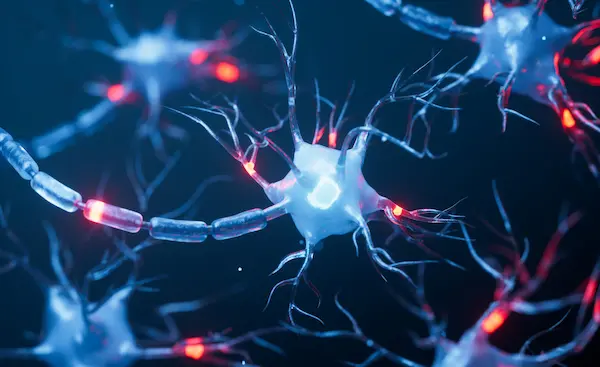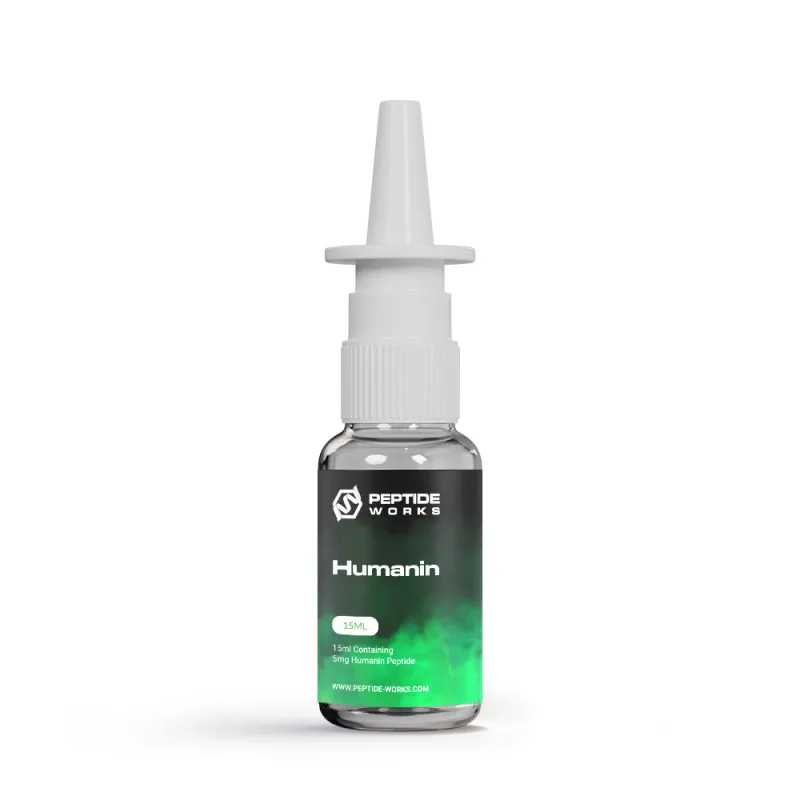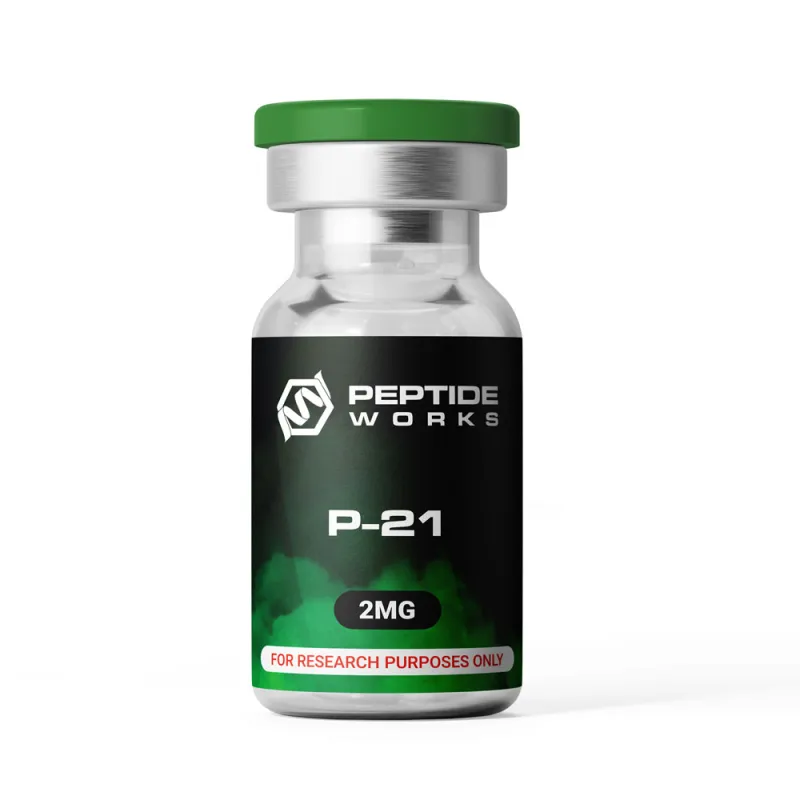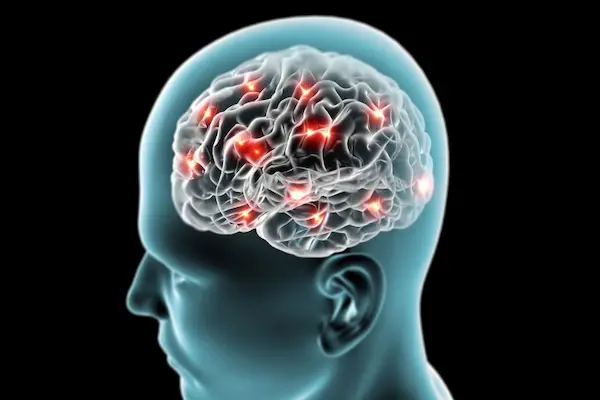
PROMO!
First order? Get 10% OFF with this code: 1storder
Written by

Alzheimer’s disease remains one of the most complex conditions to study, as it slowly impacts memory, cognition, and daily function. Current research into the treatment for Alzheimer’s is exploring peptides short chains of amino acids that influence cell signaling, energy balance, and neuron survival. These studies aim to investigate how peptides may slow down processes associated with cognitive decline.
Among them, Humanin is studied for its ability to protect brain cells from oxidative stress and toxic protein buildup. Other compounds, including P-21, linked to learning and memory, and NAD+, associated with energy repair, also show potential. Together, these candidates represent promising research directions in Alzheimer’s disease.
Peptide research has therefore turned to a critical focus: understanding how these compounds may support the survival of neurons.
Explore Humanin from Peptide Works, a mitochondria-derived peptide studied for its role in protecting neurons from oxidative stress and toxic protein buildup in Alzheimer’s research.

Peptides may support neuron survival by shielding cells from the stress driving Alzheimer’s progression. For example, Humanin helps stabilize mitochondria, the cell’s power plants, reducing oxidative damage and preserving the energy neurons need to function. Efficient mitochondria help brain cells withstand toxic stress and avoid collapse.
Studies on P-21 suggest it may influence pathways involved in learning and memory, while research on NAD+ highlights its role in restoring energy and repair inside neurons. Together, these findings show how peptide research is uncovering complementary mechanisms that could help preserve brain cells in studies of the treatment for Alzheimer’s.
Because neuron survival is closely tied to cellular energy, mitochondrial health has become another major focus in Alzheimer’s research.
Mitochondria act as the power sources of neurons, and their breakdown is a defining feature of Alzheimer’s disease. When ATP levels drop, oxidative stress intensifies, and the cell’s ability to repair itself declines, which speeds up neuronal loss.
Studies indicate that peptides such as Humanin may help steady mitochondrial activity, reducing harmful stress and preserving the energy neurons rely on.
Disruption of repair pathways adds to the problem, and research on NAD+ is examining how it may restore cellular balance. By sustaining both energy production and repair functions, peptide studies point to mitochondria as a crucial focus in the treatment for Alzheimer’s.
Beyond energy metabolism, another hallmark of Alzheimer’s is the buildup of amyloid plaques, which has become a central area of peptide research.
Shop NAD+ from Peptide Works, a cellular coenzyme researched for its role in restoring energy balance, enhancing mitochondrial health, and supporting repair processes relevant to Alzheimer’s studies.

Amyloid-beta plaques are clumps of misfolded proteins that block signals between neurons. These plaques also trigger inflammation and raise oxidative stress, which weakens repair systems in the brain. Both effects speed up the damage linked to Alzheimer’s.
Research suggests some peptides may act on these processes: Humanin may reduce stress tied to amyloid buildup, and NAD+ may help neurons maintain energy when plaques disrupt metabolism in cell and animal studies.
By targeting these points, peptide studies suggest possible ways to slow how amyloid buildup contributes to cognitive decline in the treatment for Alzheimer’s.
Beyond toxic proteins, researchers are also looking at how natural peptide levels shift with age.
Humanin levels decline with age, with sharper drops seen in Alzheimer’s patients. Since Humanin supports mitochondrial balance and cell survival, lower levels may leave neurons more vulnerable to stress and protein buildup. This decline is now seen as one of the factors that could speed up cognitive loss.
Researchers are exploring whether boosting Humanin activity might help restore protection in aging brains. By connecting aging and Alzheimer’s through this peptide, studies highlight how changes in Humanin levels could shape future approaches to the treatment for diseases.
As research connects aging with peptide decline, oxidative stress has emerged as another key driver of neuronal loss.

Oxidative stress is one of the most damaging processes linked to Alzheimer’s. It happens when unstable molecules, called free radicals, overwhelm defenses and injure brain cells. This stress disrupts mitochondria, reduces energy output, and leaves neurons more vulnerable to decline. Researchers now view oxidative stress as a key target in the treatment for Alzheimer’s.
Peptide research is exploring how to counter this process. NAD+ is studied for supporting repair and energy metabolism under oxidative pressure, while Humanin may stabilize survival pathways that help neurons resist damage. Together, these findings suggest that managing oxidative stress could play an important role in slowing Alzheimer’s progression.
In addition to managing oxidative stress, scientists are also studying how the brain clears damage through autophagy.
Autophagy is the brain’s natural recycling system, clearing misfolded proteins and damaged cell parts before they harm neurons. In Alzheimer’s, this process slows, allowing toxic proteins to remain and disrupt memory. Researchers exploring the treatment for Alzheimer’s are asking whether peptides can help restore this clean-up pathway.
Studies suggest that Humanin may trigger autophagy signals that improve the removal of harmful fragments, while P-21 is being examined in animal studies for supporting cell renewal linked to memory repair. By acting within this system, these peptides highlight how boosting autophagy could limit damage in Alzheimer’s research.
Because memory decline is such a defining feature of the disease, P-21 has become a peptide of growing interest.

Memory loss in Alzheimer’s is closely tied to weakened synapses, the junctions where neurons share signals. When these connections fail, the brain struggles to form and store new information. Research into the treatment for Alzheimer’s is now looking at peptides that may strengthen these vital pathways.
P-21 has drawn attention in preclinical studies for its role in supporting neurogenesis and synaptic plasticity. These processes help the brain adapt, repair, and rebuild circuits linked to learning. By influencing how neurons form stronger connections, P-21 research highlights new possibilities for protecting memory and slowing the decline that characterizes Alzheimer’s.
Together, these findings show how peptides are being studied across multiple Alzheimer’s pathways, shaping a more hopeful vision for the future.
Discover P-21 from Peptide Works, a synthetic peptide investigated in preclinical studies for supporting neurogenesis, synaptic repair, and pathways linked to memory in Alzheimer’s models.
As research progresses, peptides like Humanin, P-21, and NAD+ may help shape the next generation of Alzheimer’s therapies. By protecting neurons, restoring energy, and supporting repair, peptide science is opening new paths toward slowing or even preventing the disease.
Access to high-quality peptides will be essential for advancing this work. At Peptide Works, we support researchers by providing compounds for laboratory use, helping to drive the science forward. While much work remains, peptides could transform how Alzheimer’s is studied and one day reshape both treatment and prevention.
All peptides and compounds mentioned are strictly for research purposes only and not for human use.
[1] Chai GS, Duan DX, Ma RH, Shen JY, et al. Humanin attenuates Alzheimer-like cognitive deficits and pathological changes induced by amyloid β-peptide in rats. Neurosci Bull. 2014 Dec;30(6):923-935.
[2] Alqahtani SM, Al-Kuraishy HM, Al-Gareeb AI, Alexiou A,et al. The neuroprotective role of Humanin in Alzheimer’s disease: The molecular effects. Eur J Pharmacol. 2025 Jul 5;998:177510.
[3] Coradduzza D, Congiargiu A, Chen Z, Cruciani S, et al. Humanin and Its Pathophysiological Roles in Aging: A Systematic Review. Biology (Basel). 2023 Apr 6;12(4):558.
[4] Zhao L, Ma QL, Calon F, Harris-White ME, et al. Role of p21-activated kinase pathway defects in the cognitive deficits of Alzheimer disease. Nat Neurosci. 2006 Feb;9(2):234-42.
[5] Wang X, He HJ, Xiong X, Zhou S, et al. NAD+ in Alzheimer’s Disease: Molecular Mechanisms and Systematic Therapeutic Evidence Obtained in vivo. Front Cell Dev Biol. 2021 Aug 3;9:668491.
ALL CONTENT AND PRODUCT INFORMATION AVAILABLE ON THIS WEBSITE IS FOR EDUCATIONAL PURPOSES ONLY.
DISCLAIMER: These products are intended solely as a research chemical only. This classification allows for their use only for research development and laboratory studies. The information available on our Peptide Works website: https://peptide-works.com/ is provided for educational purposes only. These products are not for human or animal use or consumption in any manner. Handling of these products should be limited to suitably qualified professionals. They are not to be classified as a drug, food, cosmetic, or medicinal product and must not be mislabelled or used as such.
Peptide Works
Related Articles

What are the Best Cognitive Peptides?
Cognitive peptides are short chains of amino acids that researchers are exploring for their potential effects on brain function. They

Achieving increased skin pigmentation without prolonged sun exposure has been demonstrated with Melanotan peptides in research. Two commonly studied options,

Can PTD-DBM Hair Growth Peptide Stop Balding?
Hair thinning and balding affect millions worldwide, often leading to frustration and limited options. This challenge has driven researchers to